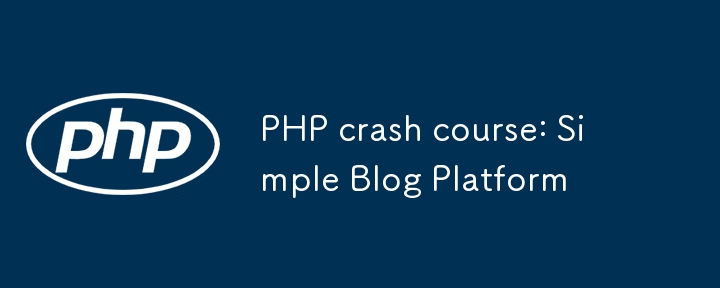Heim >Backend-Entwicklung >PHP-Tutorial >PHP-Crashkurs: Einfache Blog-Plattform
PHP-Crashkurs: Einfache Blog-Plattform
- WBOYWBOYWBOYWBOYWBOYWBOYWBOYWBOYWBOYWBOYWBOYWBOYWBOriginal
- 2024-08-05 14:54:20875Durchsuche

Eine einfache Blogging-Plattform, auf der Benutzer Artikel veröffentlichen, bearbeiten und löschen können. Gebaut mit PHP, HTML, jQuery, AJAX, JSON, Bootstrap, CSS und MySQL.
Themen: PHP, MySQL, Blog, Ajax, Bootstrap, JQuery, CSS
Schritt-für-Schritt-Lösung
1. Verzeichnisstruktur
simple-blog-platform/ │ ├── config.sample.php ├── index.html ├── db/ │ └── database.sql ├── src/ │ ├── get-post.php │ └── post-handler.php ├── include/ │ ├── config.sample.php │ └── db.php ├── assets/ │ ├── css/ │ │ └── style.css │ ├── js/ │ │ └── script.js │ └── images/ ├── README.md └── .gitignore
2. Datenbankschema
db/database.sql:
CREATE DATABASE IF NOT EXISTS blog_db;
USE blog_db;
CREATE TABLE IF NOT EXISTS posts (
id INT AUTO_INCREMENT PRIMARY KEY,
title VARCHAR(255) NOT NULL,
content TEXT NOT NULL,
created_at TIMESTAMP DEFAULT CURRENT_TIMESTAMP
);
3. Konfigurationsdatei
include/config.sample.php:
<?php
define('DB_HOST', 'localhost'); // Database host
define('DB_NAME', 'blog_db'); // Database name
define('DB_USER', 'root'); // Change if necessary
define('DB_PASS', ''); // Change if necessary
?>
4. Konfigurieren Sie die Datenbankverbindung
include/db.php:
<?php
include 'config.php';
// Database configuration
$dsn = 'mysql:host='.DB_HOST.';dbname='.DB_NAME;
$options = [
PDO::ATTR_ERRMODE => PDO::ERRMODE_EXCEPTION,
PDO::ATTR_DEFAULT_FETCH_MODE => PDO::FETCH_ASSOC,
];
// Create a new PDO instance
try {
$pdo = new PDO($dsn, DB_USER, DB_PASS, $options);
$pdo->setAttribute(PDO::ATTR_ERRMODE, PDO::ERRMODE_EXCEPTION); // Set error mode to exception
} catch (PDOException $e) {
echo 'Connection failed: ' . $e->getMessage(); // Display error message if connection fails
}
?>
5. HTML- und PHP-Struktur
index.html
<!DOCTYPE html>
<html lang="en">
<head>
<meta charset="UTF-8">
<meta name="viewport" content="width=device-width, initial-scale=1.0">
<title>Simple Blog</title>
<link rel="stylesheet" href="assets/css/style.css">
<link rel="stylesheet" href="https://stackpath.bootstrapcdn.com/bootstrap/4.5.2/css/bootstrap.min.css">
</head>
<body>
<div class="container">
<h1 class="mt-5">Simple Blog</h1>
<div id="posts"></div>
<button class="btn btn-primary mt-3" data-toggle="modal" data-target="#postModal">Add Post</button>
</div>
<!-- Modal for adding/editing posts -->
<div class="modal fade" id="postModal" tabindex="-1" role="dialog" aria-labelledby="postModalLabel" aria-hidden="true">
<div class="modal-dialog" role="document">
<div class="modal-content">
<div class="modal-header">
<h5 class="modal-title" id="postModalLabel">Add Post</h5>
<button type="button" class="close" data-dismiss="modal" aria-label="Close">
<span aria-hidden="true">×</span>
</button>
</div>
<div class="modal-body">
<form id="postForm">
<input type="hidden" id="postId">
<div class="form-group">
<label for="title">Title</label>
<input type="text" class="form-control" id="title" required>
</div>
<div class="form-group">
<label for="content">Content</label>
<textarea class="form-control" id="content" rows="3" required></textarea>
</div>
<button type="submit" class="btn btn-primary">Save Post</button>
</form>
</div>
</div>
</div>
</div>
<script src="https://code.jquery.com/jquery-3.5.1.min.js"></script>
<script src="https://cdnjs.cloudflare.com/ajax/libs/twitter-bootstrap/4.5.2/js/bootstrap.bundle.min.js"></script>
<script src="assets/js/script.js"></script>
</body>
</html>
6. JavaScript und AJAX
assets/js/script.js
$(document).ready(function() {
// Load posts when the page loads
loadPosts();
// Handle form submission
$('#postForm').submit(function(event) {
event.preventDefault(); // Prevent default form submission
var postId = $('#postId').val();
var title = $('#title').val();
var content = $('#content').val();
$.ajax({
url: 'src/post-handler.php',
type: 'POST',
dataType: 'json',
data: {
id: postId,
title: title,
content: content
},
success: function(response) {
if (response.success) {
$('#postModal').modal('hide');
loadPosts(); // Reload posts after saving
} else {
alert('Error: ' + response.message);
}
}
});
});
// Load posts function
function loadPosts() {
$.ajax({
url: 'src/get-posts.php',
type: 'GET',
dataType: 'json',
success: function(data) {
var postsHtml = '';
$.each(data.posts, function(index, post) {
postsHtml += '<div class="post"><h2>' + post.title + '</h2><p>' + post.content + '</p></div>';
});
$('#posts').html(postsHtml);
}
});
}
});
7. Backend-PHP-Skripte
src/get-posts.php
<?php
include '../include/db.php';
header('Content-Type: application/json');
try {
$stmt = $pdo->query('SELECT * FROM posts ORDER BY created_at DESC');
$posts = $stmt->fetchAll(PDO::FETCH_ASSOC);
echo json_encode(['posts' => $posts]);
} catch (PDOException $e) {
echo json_encode(['error' => $e->getMessage()]);
}
?>
src/post-handler.php
<?php
include '../include/db.php';
header('Content-Type: application/json');
// Retrieve POST data
$id = isset($_POST['id']) ? intval($_POST['id']) : 0;
$title = $_POST['title'];
$content = $_POST['content'];
try {
if ($id > 0) {
// Update existing post
$stmt = $pdo->prepare('UPDATE posts SET title = ?, content = ? WHERE id = ?');
$stmt->execute([$title, $content, $id]);
} else {
// Insert new post
$stmt = $pdo->prepare('INSERT INTO posts (title, content) VALUES (?, ?)');
$stmt->execute([$title, $content]);
}
echo json_encode(['success' => true]);
} catch (PDOException $e) {
echo json_encode(['success' => false, 'message' => $e->getMessage()]);
}
?>
6. CSS-Styling
assets/css/style.css
body {
font-family: Arial, sans-serif;
margin: 0;
padding: 0;
}
.container {
margin-top: 20px;
}
.post {
border: 1px solid #ddd;
padding: 15px;
margin-bottom: 15px;
background-color: #f9f9f9;
}
Dokumentation und Kommentare
- config.php: Enthält die Datenbankkonfiguration und stellt über PDO eine Verbindung zu MySQL her.
- index.php: Hauptseite mit HTML-Struktur, enthält Bootstrap für die Gestaltung und ein Modal zum Hinzufügen/Bearbeiten von Beiträgen.
- assets/js/script.js: Verarbeitet AJAX-Anfragen zum Laden und Speichern von Beiträgen. Verwendet jQuery für die DOM-Manipulation und AJAX.
- get-posts.php: Ruft Beiträge aus der Datenbank ab und gibt sie als JSON zurück.
- post-handler.php: Verwaltet die Erstellung und Aktualisierung von Beiträgen basierend auf dem Vorhandensein einer ID.
Dieses Setup bietet eine grundlegende Blogging-Plattform, auf der Benutzer Beiträge hinzufügen und bearbeiten können. Sie können dies erweitern, indem Sie Benutzerauthentifizierung, Beitragskategorien, Kommentare und mehr hinzufügen.
Verbindungslinks
Wenn Sie diese Serie hilfreich fanden, denken Sie bitte darüber nach, dem Repository einen Stern auf GitHub zu geben oder den Beitrag in Ihren bevorzugten sozialen Netzwerken zu teilen? Ihre Unterstützung würde mir sehr viel bedeuten!
Wenn Sie weitere hilfreiche Inhalte wie diesen wünschen, folgen Sie mir gerne:
- GitHub
Quellcode
Das obige ist der detaillierte Inhalt vonPHP-Crashkurs: Einfache Blog-Plattform. Für weitere Informationen folgen Sie bitte anderen verwandten Artikeln auf der PHP chinesischen Website!
In Verbindung stehende Artikel
Mehr sehen- So verwenden Sie cURL zum Implementieren von Get- und Post-Anfragen in PHP
- So verwenden Sie cURL zum Implementieren von Get- und Post-Anfragen in PHP
- So verwenden Sie cURL zum Implementieren von Get- und Post-Anfragen in PHP
- So verwenden Sie cURL zum Implementieren von Get- und Post-Anfragen in PHP
- Alle Ausdruckssymbole in regulären Ausdrücken (Zusammenfassung)

